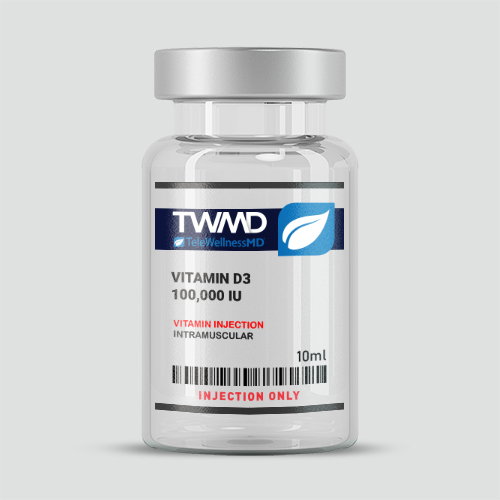Select your time!
My Account


Vitamin D3 Levels < 30 100,000IU/mL 5mL Vial
Vitamin Injections
Health & Wellness
Key Benefits:Boosts immune respsone
Decreases inflammation
Vitamin D3 100,000IU/mL 5mL Vial

Intramuscular injection
10 Week Supply
Requires telehealth consult
Not available in CA, IA or WI
A majority of the population are Vitamin D3 deficient, boost D3 levels to stabilize your immune system and more. Labs are required for a prescription to be approved.
Vitamin D3
Brent Agin MD
04/11/2024 3:53PM
A majority of the population are Vitamin D3 deficient, boost D3 levels to stabilize your immune system and more. Labs are required for a prescription to be approved.
One of the most important takeaways from the recent pandemic was the association with low vitamin D levels, the severity and duration of COVID infections, and the post-viral syndrome that many suffered from.
“Over 80% of 200 COVID-19 patients in a hospital in Spain have vitamin D deficiency, according to a new study published in the Endocrine Society’s Journal of Clinical Endocrinology & Metabolism.”
It is now clear that vitamin D has important roles in addition to its classic effects on calcium and bone health. Vitamin D can directly influence our immune response and, therefore, deficiency in vitamin D is associated with increased autoimmunity, as well as an increased susceptibility to infection. Vitamin D is not just a vitamin, but a prohormone (a molecule similar in structure to a steroid) that targets over 2,000 genes in the human body). With its many interactions, vitamin D3 not only helps strengthen our bones, but many studies have shown it may help prevent diabetes, heart disease and various cancers, reduce inflammation, and boost mood. Recently, vitamin D’s importance in optimizing cardiovascular health has been solidified through its role in reducing calcifications in blood vessel walls. Accordingly, low vitamin D levels are associated with increased risk for development of the coronary arterial calcifications seen in atherosclerosis. Getting Vitamin D3 levels into sufficient range will help stabilize your immune system and help provide protection against various cancers and heart disease. Current research has implicated vitamin D deficiency as a major factor in the pathology of at least 17 varieties of cancer, as well as heart disease, stroke, hypertension, autoimmune diseases, diabetes, depression, chronic pain, osteoarthritis, osteoporosis, muscle weakness, muscle wasting, birth defects, periodontal disease, and more.
There are several forms of vitamin D, but the two main types are D2 and D3. We get vitamin D3 from the sun that initiates the conversion of vitamin D2 to D3. Due to the increasing use of sunscreens and less outdoor activity, we are not absorbing the necessary amounts of sun needed to adequately keep our Vitamin D3 stores, and deficiencies are found in the majority of the population.
Vitamin K2
Vitamins D and K work together to ensure calcium is correctly distributed in our bodies. While it is established that vitamin D plays an overarching role in stabilizing bodily calcium levels in our blood, vitamin K helps to ensure the calcium is distributed specifically to our bones.
Benefits of Vitamin D
- May reduce the severity and frequency of asthma symptoms
- Reduces the risk of developing rheumatoid arthritis Increases bone mass
- Reduces the risk of cardiovascular disease Important during pregnancy for normal brain development (many studies show a possible link between Autism and low vitamin D levels)
- Decreases inflammation that can weaken the immune system
- May reduce the risk of developing multiple sclerosis
- May decrease the risk of death (some studies have shown a 47% higher death rate among those with vitamin D levels between 25 and 49.9 nmol/L, compared to those with vitamin D levels of 100 or higher)
- Helps support strong bones and teeth
- Helps reduce the frequency and duration of Herpes Type 1 and 2 outbreaks
- Helps lessen the frequency, duration, and severity of viral infections
- Helps reduce Triglycerides and LDL cholesterol levels
Vitamin D3 requires recent labwork to be prescribed, within the last six weeks:
- If you have current labs - simply provide us a copy and schedule a consultation. Our medical support team will review the labs and prescribe if deemed necessary.
- If you do not have current labs and live in the following states: Arizona, California, Colorado, Connecticut, Florida, Georgia, Hawaii, Idaho, Illinois, Indiana, Kentucky, Maine, Maryland, Massachusetts, Michigan, Missouri, Nevada, New Hampshire, New Jersey, New York, North Carolina, Ohio, Oklahoma, Oregon, Pennsylvania, Rhode Island, Tennessee, Texas, Utah, Virginia, Washington, Wisconsin, or Wyoming - You can purchase the Vitamin D3 Lab + Lab Review. A lab request will be sent to you, which you can take to any LabCorp location. LabCorp automatically sends us a copy of your lab result and then a TeleWellnessMD medical support representative will contact you for your review/consultation and prescribe Vitamin D3 injection if necessary.
- If you live in these states: Alabama, Alaska, Arkansas, Delaware, Iowa, Kansas, Louisiana, Minnesota, Mississippi, Montana, Nebraska, New Mexico, North Dakota, South Carolina, South Dakota, Vermont, or West Virginia - You will need to request to have your Vitamin D3 level checked from your primary care doctor and then provide us with a copy of your lab results for our medical support team to review.
Labs should be done to review levels and update prescription every eight weeks.
Safety Information
Important Information:
Disclaimer: Compounded medications are customized pharmaceutical products and have not been approved by the Food and Drug Administration as safe and effective for the treatment of any medical condition. Compounded medications offered as an alternative to FDA approved medications and may contain FDA approved medications and non-FDA approved medications.
Product Supplies:
23G x 1" 1cc syringe - 10 Alcohol Pads - 10
Ingredients:
Cholecalciferol (D3) (Grapeseed Oil) 100,000 IU/mL 5 mL Injection
F.A.Q.
Vitamin D3 injections are administered via intramuscular injections.
Vitamin D3 requires labwork to determine if injections are necessary. If deemed necessary, labwork should be done every eight weeks to monitor levels and update your prescription.

 US-Licensed Medical Providers & Pharmacies
US-Licensed Medical Providers & Pharmacies